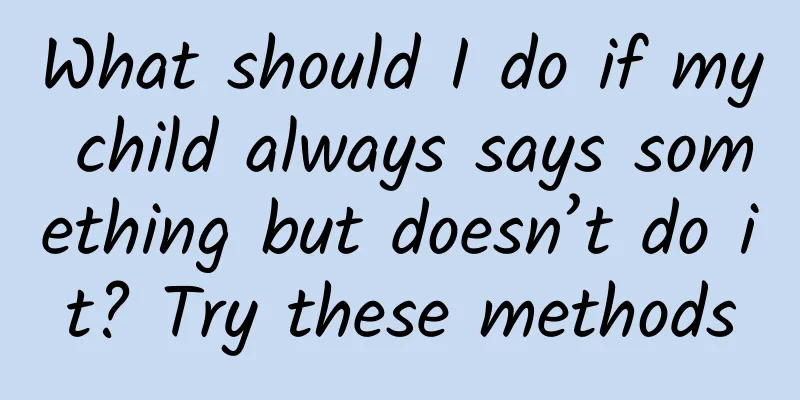What should I do if my child always says something but doesn’t do it? Try these methods

|
"Children always say good things but fail to do them in the end!" "He often promised things well, but broke his promises at the last minute." "I finally made some changes, but after a few days, I was back to the old ways!" The above are the words that parents who bring their children to the psychological clinic for consultation often complain about. Children always "say what they can't do", is it a psychological problem or a moral problem? Should they be treated or should they be strictly disciplined? In fact, we cannot give a standard answer to this problem of parents, nor can we give a solution that is either this or that. But some of these problems are indeed psychological problems, which deserve the parents' special attention. "Doing what you say" is a skill It is not easy for children to "do what they say" because it involves their abilities. First of all, the rationality of the goal is very important. A big goal that is beyond the ability of a child is doomed to fail before it even starts. So we often say that a good goal should be "something you can reach with a little effort." Parents should first help their children measure whether their goals are within their abilities. Secondly, to "walk the talk", children are also required to have the ability to deal with unexpected situations and be able to adapt at any time. Usually, when people make plans, they ignore some potential difficulties. Once they are actually implemented, potential difficulties will appear and seriously hinder the implementation of the plan. For example, the child planned to exercise outdoors, but it rained every day this week, so the child did not exercise all day. Another example is that the child promised not to play with the phone, but today he was in a bad mood and wanted to vent, so he had to play a few rounds of games. Faced with this situation, whether the child has the ability to adjust in time becomes the key to whether he can "do what he says". In this sense, "doing what you say" is an ability that needs to be cultivated. Parents should help their children set a reasonable goal and help them learn to deal with unexpected situations, rather than simply regarding "doing what you say" as a virtue. If you have an idea, your body must keep up Some parents often complain that their children agreed to go to school the night before, but refused to go the next day. Some children even cried and refused to enter the school gate. In this case, we found that the children may have "school phobia". These children will experience obvious physical discomfort at the last moment, such as chest tightness, dizziness, palpitations, stomachaches, etc., or an inexplicable fear, and the only thought at that moment is to escape. At this time, the child needs treatment. It is recommended that parents use drugs or a combination of drugs and non-drug treatments to solve the problem of "school phobia". If you promise to change or do something, you need to be consistent in what you say and what you do. This is a behavior that many of us parents recognize. However, after a few days of recovery, the child's "old problem" recurs, which can easily make parents angry. Most of the time, we tend to focus on the "old problems" of children. In fact, more positive psychological intervention studies have found that we may need to focus more on positive factors, such as "getting better for a few days." If at this time, we think about the child's situation starting from the following questions, we will probably be close to successfully helping the child "do what he says". These questions include: "It's only been a few days since he got better, how is he better?" "How does he view his own 'goodness'?" "What is the reason why he is willing to be 'good'?" "Who has the greatest influence on him, and what does he care most about other people's ideas?" "If he gets better a little bit, how will he be different from now?" "Assuming he is willing to do so, where is he most likely to change first?" "What do we do, is he willing to change more?" ... Take care of yourself first, then you can take care of your children When faced with a child who refuses to change despite repeated teaching, both parents and teachers must learn to calm down their emotions first, so that they can truly help their children. As the saying goes, you must first calm yourself down before you can calm your children down. In addition to ability, sometimes we also face the situation that children lack internal motivation. "I know everything, but I just don't want to act!" This state is a portrayal of this type of child. In order to better solve this kind of problem, we need to know the following principles. **First, avoid wishful thinking for the good of your children, and it is best to invite your children to participate in decision-making. **Many times, parents easily make decisions for their children for the good of their children, and firmly believe that their children will one day understand their parents' painstaking efforts. Little do they know that it is precisely because children lack participation and have no opportunity to express their own opinions that their "disobedient behavior" will turn into "unconscious confrontation." **Second, having the ability does not mean you must become something, having the will is important. **If we find that our children have certain abilities, such as playing the piano very well, or even have a certain talent, then we will help them complete their life design without hesitation. However, "I have the ability to play the piano well" does not mean "I am willing to become a pianist". Parents will constantly lament that their children obviously have this level, why don't they follow the route we designed? Don't forget that if interest cannot be an interest, but must become a certain purpose and a certain result, it will often go against one's wishes. **Third, if there is only result but no process, it is easy to make people slack off. **We believe that if a child hates studying, it is generally because he hates studying. However, in real life, we find that a considerable proportion of children who hate studying do not hate studying itself, but because they have too high expectations for their learning results and fail to meet their expectations, which eventually leads to an escapist mentality. Parents think that their children lack motivation to learn, but the fact is just the opposite: because children and adults focus too much on results, children are unable to experience the joy of the learning process and eventually become unable to learn. |
Recommend
What should girls do if they sweat a lot in summer?
The weather is hot in the summer. Some people may...
I got pregnant after 20 days of eating warm uterus pregnancy food
Nuan Gong Yunzi Pills are developed using wild Ch...
Anal swelling during ovulation
The ovulation period is a very important period f...
Why do girls not have their periods?
Why don’t girls have their periods? Generally spe...
How long should pregnant women take folic acid?
Women who have given birth know that they need to...
What to do if women have poor blood circulation
Poor blood circulation can cause cold hands and f...
What causes black nails in pregnant women?
Women must pay more attention to their bodies aft...
Why do women always feel sleepy?
Nowadays, most women have to hold up half the sky...
Symptoms of pelvic effusion
Pelvic effusion is a very common gynecological di...
What is the reason for menstrual blood not being red?
Normal menstrual blood is red in color. Some wome...
Will taking birth control pills delay my period?
If women want to take emergency contraception, th...
How did the doctor know that I had allergic rhinitis? Immersive experience of rhinitis diagnosis and treatment
In early spring in March, the rain continues, the...
Japanese actor Haruma Miura committed suicide at home. Here are the truths you don't know about depression
On July 18, actor Haruma Miura was absent from wo...
What medicines can I take for abdominal pain 10 days after medical abortion
Generally speaking, after a medical abortion, the...









